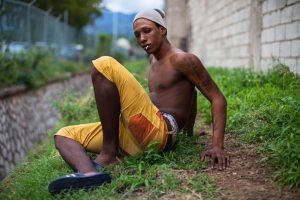By: D’Andre Gordon
Impunity Watch Staff Writer
Kingston, Jamaica — In 2006, Times dubbed Jamaica “The Most Homophobic place on Earth.” Seven years later, Dwayne Jones, a 16-year-old transgender woman was brutally murdered at a party for wearing clothing considered feminine. Dwayne Jones’ tragic death sparked worldwide condemnation and certainly did not help the island state of Jamaica shake the label Times assigned years earlier. Dwayne’s murder was not an isolated incident, but part of a long history of state-sponsored violence against LGBTQ individuals.

At minimum, the violence is impliedly supported by the state through a lack of judicial enforcement against perpetrators of crimes against LGBTQ people. Many of the heinous acts of violence against LGBTQ people in Jamaica stem from homophobic legislation originating in the colonial era known as The Offences Against the Person Act 1864, in combination with religious zealotry.
Unfortunately, it is incredibly difficult and arguably impossible for LGBTQ people to seek relief when they suffer harm based on their sexual identity because the “savings clause” in the Jamaican Constitution effectively bars discriminatory provisions in The Offences Against the Person Act 1864 from constitutional scrutiny. As such, Plaintiffs Gareth Henry and Simone Edwards brought a case against Jamaica at the Inter-American Commission on Human Rights. Plaintiffs alleged The Offences Against the Person Act 1864 violated the principle of non-discrimination and equality before the law, right to life and to humane treatment, right to privacy, right to freedom of thought and expression, right to family life, right to freedom of movement and residence, right to participate in government, and right to health. This Act prohibits same-sex sexual activity and criminalizes acts of “buggery” and “gross indecency.” Consequently, anyone (only men) convicted under this law face a maximum penalty of ten years imprisonment with hard labor. Under current Jamaican law, LGBTQIA people have no protections and The Offences Against the Person Act 1864, a remnant of British colonization, reinforces and legitimizes violence against LGBTQIA people.
Plaintiffs now live abroad where they have found safety. It is not unusual for LGBTQ victims of violence to flee the island and seek asylum elsewhere. Further, their families can also become targets. Because Jamaica lacks LGBTQ protections, LGBTQ people are frequently subjected to mob violence, corrective rape, extortion, harassment, forced displacement, and discrimination. Many of these acts are perpetrated by state officials including law enforcement.
After a decade long struggle, the IACHR issued a public report in favor of Plaintiffs on December 31, 2020, declaring Jamaica non-compliant with its legal obligations under the American Convention on Human Rights. This decision is a landmark decision because it was the first decision of its kind issued by the IACHR regarding the rights of LGBTQ individuals in the Caribbean. The Commission laid out an array of recommendations for Jamaica to protect LGBTQ individuals. Two of the recommendations were repealing sections 76, 77, and 79 of The Offences Against the Person Act and adoption of anti-discrimination legal framework to prohibit discrimination based on sexual orientation, gender identity or expression – real or perceived – and body diversity.
The Commission’s decision is non-binding but is a ray of optimism because it may pressure the Jamaican Parliament to act in the interests of LGBTQ individuals. The decision is a massive victory for not only the two plaintiffs, but all LGBTQ people in Jamaica and the Caribbean. Though the decision was met with opposition from anti-LGBTQ advocates, it is incumbent on the Jamaican state to act with haste by passing laws in support of LGBTQ people because an injury to one is an injury to all. Whether the country will pass protections for LGBTQ people and enforce them is still uncertain, but dedicated activists continue to urge the government to do so.
For further information, please see:
CBC Radio – After fleeing to Canada, activist helps secure victory for LGBTQ rights in Jamaica – 18 Feb. 2021
IACHR – Report No. 401/20. Case 13,095. Merits (Publication) – 31 Dec. 2020
Laws of Jamaica – The Offences Against the Person Act – 1 Jan. 1864
Making Queer History – Dwayne Jones and the dangers of tragedy tourism – 09 Dec. 2020
The New York Times – On Being Queer in the Caribbean – 30 Oct. 2015
U.S. Dep’t. of State – 2021 Country Reports on Human Rights Practices: Jamaica – 2021